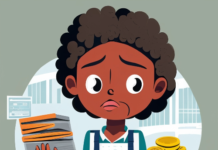Is the Live-in Caregiver Program tantamount to modern-day slavery? Sure they get a meager salary, but what are the implications of such a program? Sure there are loving, caring families that welcome the caregivers into their homes and treat them like part of the family. But for every two good families who do that, there are eight who don’t, or so I’m told.
It’s summer now, so I like to eat my lunch at the park and get some sun. I always notice this particular woman who has a very sad look on her face. She seemed to be there every time I went to have lunch. There is just no ignoring her eyes. I try, but somehow my eyes always seem to go back to hers. She smiles and plays with the kids she takes care of but there is such sadness in her eyes.
I have never been one to meddle, but I decided to strike up a conversation one day. (Yep, I’m shedding my antisocial self). It was actually quite pleasant talking to her. Her English needed some work but not so much that I couldn’t understand her. I made it my point of duty to speak to her each time I saw her. Although I didn’t ask her right off the bat, curiosity was killing me as to what made her so sad.
The day finally presented itself where I could ask the question without seeming intrusive. Her answer almost made me choke on my sandwich. She said she wanted to be free! I couldn’t understand what she meant, this is Canada, after all. Everyone was free. I asked her to clarify, maybe it was the slight language barrier that was making my understanding muddled. She explained and it was what she said the first time, she wanted to be free. She said that she came on the Live-In Caregiver Program in 2008. She was told that she would be able to achieve permanent status in eighteen months. In search of a better life for herself and her family, mainly her husband and four children, she jumped at the chance. She knew she had to leave them behind but thought they could endure eighteen months of being apart. It has been four years.
She said that she signed a contract and boarded a flight for the long journey to Canada. On reaching here, however, she was told by the agency she signed up with that the job was no longer available. She said she did not sleep that night because she was worried about her family’s welfare, everything depended on her. She expressed this to the agent and was told not to worry, she would get a job soon. She did, but there was no contract, no terms of agreement, and she had to sleep on a piece of cardboard in the basement. I was shocked and appalled! I wanted to tell her that surely she was making this up, but her eyes told me that what she was saying was the truth. She said she left after some time but was in constant fear that the people would call the authorities. She lived like a fugitive, moving from place to place and doing odd cleaning jobs to make money to send home. All the while in sheer terror that she would be caught and sent back home to live in abject poverty with no prospects. She didn’t know at the time that all she needed to do was look for a sponsor, she thought she was breaking the law.
By the time she knew what she had to do almost a year had gone by. Her family’s dreams to join her were further stalled. She found a new sponsor, the people she was with now, but she had to work with them for a six-month trial period so they could see if she was the right ‘fit’ for their family (further delay). She decided that however they treated her she would endure it so that there wouldn’t be any more delays.
This lady sat and spoke to me and it was like a floodgate opened, the words just poured out of her mouth. It was like once she started talking about it she could not stop. Even when she had to go see to one of the children, she would come back and pick up right where she left off.
She wanted to be somebody here, to make a positive contribution to the society. She wanted to go to school but she said she wasn’t allowed to. She said there was a clause in the Live-In Caregiver contract that prohibited studying, not even part-time. I found this surprising because, I thought, what if their application is refused? What kind of livelihood would they then be asked to return to their home country to do? After spending all this time caring for someone else’s child, they had to return with not even a better chance of providing for their own. Who thinks up these laws? When did we cease to be humanitarians? I’d always just taken it for granted that we were, that we always looked out for the welfare of everyone, sincerely, and with no ulterior motives. This just seemed to me like we were using people.
Why is it such a drawn-out process to reunite the caregivers with their families? What about the long-term implications it may have on their children after they did such an excellent job of taking care of ours? Or are our children all that matter? What a selfish view! Isn’t it a given that we take care of the people who are taking care of our future? The happier the caregiver is the better for the children. They make our lives a little easier when they provide care for our precious little ones, and that is not all they’re required to do, as I was slowly finding out.
The sad eyes told a story of pain to go along with the words, the eyes of someone who questions their worth. Min (name changed to protect her identity) told me that prior to coming here she had worked in the financial industry, then she lost her job. She was highly educated but her education, she was told, was not on the same level as the Canadian standard. She would have to go back to school all over again if she ever wanted to resume working in her field. (This reminded me of a cabbie I’d met who was a dentist in his home country).
She said it was hard for her to be treated like a third-class citizen but that she took it as a lesson in humility. Min told me that at her current job, she did the gardening, cooking, cleaning, laundry, ran errands, was in charge of garbage disposal, and had to take care of three boys. At times, she said she went to bed at 11 p.m. by the time her work was done. Then she had to be up at 6:30 to do it all again. All the while being paid below minimum wage and without overtime. “Why do you put up with it?”, I asked. “Because I can’t do any better”, she replied, “my family needs the money”.
I felt powerless to help her, all I could do was tell her how sorry I was that she was going through this. There were no appropriate words to say to someone who was hurting. I couldn’t say I understood because I didn’t. I couldn’t say it would be alright soon because I didn’t know if it would. I just listened.
She said her daughters were now teenagers and she was worried that they wouldn’t have their mother’s guidance to get them through any difficulty they may encounter. At this, she burst into tears, which quickly stemmed because she had to run after one of the boys who was going up the slide. Our conversation ended at that moment for that day, her focus was now on her young charges. Thoughts of her own children seemed to be put aside for now, her attention turned to the little boys.
There is a developmental stage in every child’s life, zero to six years, when the fundamentals of their personalities are formed. Children who grow up without their mothers, or someone who shows them unconditional love show negative traits in their personalities. What are the repercussions of these separations? Do they produce angry children with abandonment issues? Some scholars should do a study about it, I’m sure the findings would be phenomenal. Sure there are children of these circumstances who go on to do exceptionally well but there are others who don’t.
How can one’s yearning for a better life for their children be negative? As parents, isn’t that what we all want? I can just imagine that Min must have felt like an epic failure as a parent because, in her attempt to provide them with a better life, she might end up harming them instead.
Is there anyone who will empathize with the caregivers? They are raising and training the future Prime Minister, doctors, lawyers, politicians, etc. My hope is that someone with some clout sees this post and decides to help them. Help them shorten the reunification time. Canada is big on families, after all. The families of the caregivers are going to be future members of our society, let’s give them a smooth transition. Somebody, anybody, HELP. Please?




